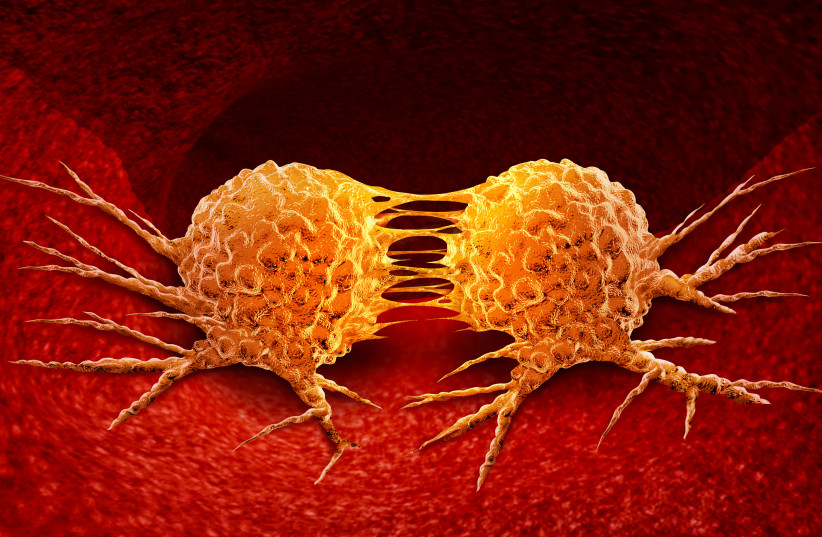Hadassah-University Medical Center discovers mechanism contributing to cancer in overweight women
Earlier studies have found that several types of cancer are directly affected by obesity, including breast cancer, which is dependent on the hormone estrogen in postmenopausal women.

Dividing cancer cell (photo credit: INGIMAGE)
Hadassah-University Medical Center researchers said they have found
the mechanism that contributes to the aggressive progression of breast cancer in overweight women.
“In
the new study, we were able to characterize one of the mechanisms of
increased progression of breast cancer in overweight patients – a
growing phenomenon in Western countries,” said Prof. Tamar Peretz, who
was the clinician involved in the study led by Prof. Michael Elkin.
The study was published in the peer-reviewed Cancer Research journal. Elkin recently received a grant from the Israel Cancer Research Fund to continue this research.
Specifically, the researchers were able to demonstrate the role of the enzyme called heparanase and its effect on cancer in overweight patients.
Heparanase
is a unique enzyme that was previously characterized and cloned by
Prof. Israel Vlodavsky at Hadassah. This enzyme, Peretz explained, plays
a central role in the ability of cancer cells to penetrate blood
vessels, thus contributing to the progression of the cancer process
through the development of metastases.

THE HADASSAH-UNIVERSITY Medical Center campus is seen in Ein Kerem, Jerusalem . (credit: MOSHE SHAI/FLASH90)
“We
wanted to understand the mechanism by which the link between obesity
and cancerous growth exists and what its exact effect is,” she said.
According
to Peretz, earlier studies have found that several types of cancer are
directly affected by obesity, including breast cancer, which is
dependent on the hormone estrogen in post-menopausal women. She said
that cancer manifests itself more aggressively and treatments are often
less effective in overweight patients diagnosed with estrogen-dependent
breast cancer.
The
team used obese mice to do their study, dividing them into two groups.
One group had the presence of the enzyme heparanase, and the other
didn’t. What they found was that when they deleted the ability of the
heparanase to act, the mice were no longer resistant to therapy.
“The unequivocal finding was that in a mouse lacking the enzyme
heparanase, obesity had no effect at all on tumor development,” Peretz
said.
Next, she said, the goal would be to develop customized treatments for patients based on knowledge of this mechanism.

No comments:
Post a Comment
Stick to the subject, NO religion, or Party politics